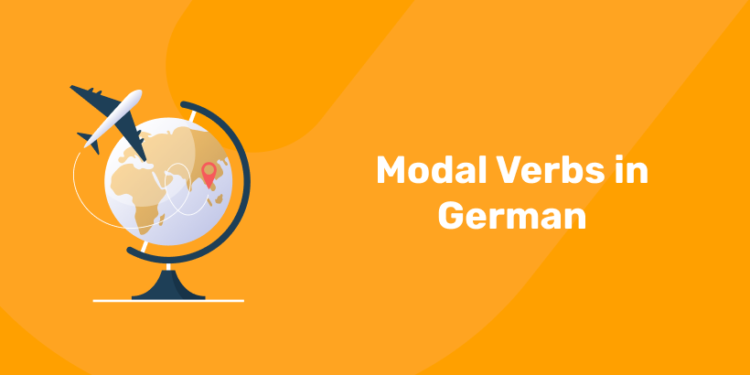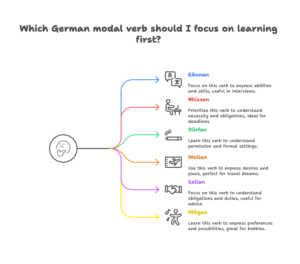Table of Contents
German modal verbs are like pieces in a puzzle, shaping sentences, adding clear meaning. They show ability, permission, necessity, like notes in a song. This blog shares easy tips to master modal verbs, like chatting with a friend. From lists to past tense, it’s your guide for Indian learners seeking German fluency. Packed with conjugation tips, sentence rules, practice ideas, it’s for students wanting clear speech. Ready to nail German modal verbs smoother than a pen on paper? Grab a notebook, let’s dive in!
Master the German Language with Entri App! Click Here for Free Trial Class!
Introduction
German modal verbs are like keys on a piano, changing sentences to sound right, clear, strong. They pair with other verbs, showing ability, permission, necessity. Indian learners use them for exams, job interviews, travel talks. For example, saying “I can speak German” needs correct modal forms. So, what are these verbs, how do they work? This post covers their list, conjugation, sentence structure, past tense, questions, with tips to shine. Whether you’re starting or improving, these tips keep it simple, fun. Ready to master German modal verbs? Let’s jump into the language maze!
What Are Modal Verbs?
1: How do you say "Good Morning" in German?
Modal verbs change another verb’s meaning, like adding sugar to tea. They show ability, permission, necessity, desire, obligation, possibility. In German, they’re special, pairing with an infinitive verb at the sentence’s end. Unlike regular verbs, modals have unique stem changes, different rules.
Use Cases
- Ability: Show what you can do, like “Ich kann schwimmen” (I can swim). Indian learners use this for skills, like coding, dancing. For example, “können” helps in job interviews.
- Permission: Allow actions, like “Du darfst gehen” (You may go). Common in formal requests, like asking for leave.
- Necessity: Show musts, like “Ich muss lernen” (I must study). Indian students use it for exam prep.
- Desire: Show wants, like “Ich will reisen” (I want to travel). Great for travel plans.
- Obligation: Show duties, like “Du sollst helfen” (You should help). Used for responsibilities.
For example, modals make sentences clear, flexible. So, learning them improves speech, confidence. Practice on LingQ to hear real examples.
Common Mistakes
- Using wrong endings, like “du kann” instead of “du kannst.” Fix by memorizing -st for du.
- Placing infinitives early, like “Ich kann Deutsch sprechen” instead of “Ich kann sprechen Deutsch.” Practice sentence order daily.
- Forgetting stem changes, like saying “du mag” instead of “du magst.” So, drill vowel shifts. Write ten sentences daily to avoid errors, like “Ich will lernen” for practice.
Free German A1 Mock Tests – Powered by AI!
Test your skills on our interactive platform. Get instant feedback from our AI to help you communicate better and track your progress. Start your free German mock test now.
Test Your German A1 for FreeList of German Modal Verbs
German has six main modal verbs, like buttons on a remote, each with a special job.
- können: Can, could (ability). Example: “Ich kann Deutsch sprechen” (I can speak German). Indian learners use it for skills like writing, singing.
- müssen: Must, have to (necessity). Example: “Du musst arbeiten” (You must work). Perfect for deadlines, study goals.
- dürfen: May, be allowed to (permission). Example: “Wir dürfen rauchen” (We may smoke). Used in formal settings, like permissions at work.
- wollen: Want to (desire). Example: “Ich will reisen” (I want to travel). Great for expressing travel dreams, plans.
- sollen: Should, supposed to (obligation). Example: “Du sollst helfen” (You should help). Common for duties, advice.
- mögen: Like to, may (liking, possibility). Example: “Ich mag tanzen” (I like to dance). Fun for hobbies, preferences.
For example, Indian learners use “können” in interviews to show skills, “müssen” for exam tasks. So, memorize these verbs first. Practice with flashcards, write “Ich kann lernen” daily. Common errors include mixing “mögen” with “wollen” for liking. For example, saying “Ich will tanzen” (I want to dance) instead of “Ich mag tanzen” (I like to dance). So, test each verb in five sentences daily, like “Du sollst lesen” for obligation. Use apps like Babbel to reinforce the list. Start with “können,” “müssen” for quick wins, then add others.
|
Goethe 2025 Exam Dates: Multiple Test Centers |
|
| Trivandrum Goethe Exam Dates | Kochi Goethe Exam Dates |
| Chennai Goethe Exam Dates | Coimbatore Goethe Exam Dates |
Present Tense Conjugation of Modal Verbs
Modal verbs conjugate differently, like a song with a unique beat. They change stem vowels in du and er/sie/es forms, often use shorter stems. Here’s how they work in present tense, based on the reference blog.
Conjugation Table
| Pronoun | können | müssen | dürfen | wollen | sollen | mögen |
| ich | kann | muss | darf | will | soll | mag |
| du | kannst | musst | darfst | willst | sollst | magst |
| er/sie/es | kann | muss | darf | will | soll | mag |
| wir | können | müssen | dürfen | wollen | sollen | mögen |
| ihr | könnt | müsst | dürft | wollt | sollt | mögt |
| sie/Sie | können | müssen | dürfen | wollen | sollen | mögen |
For example, Indian learners practice “du kannst” for skills, “ich muss” for tasks. So, drill these endings daily. Stem changes, like “können” to “kann,” make modals tricky. Common errors include saying “du kann” or “er magst.” Fix by practicing “du” forms, like “du willst” for desire. Write “Ich kann singen” ten times to lock in patterns. Use apps like FluentU for conjugation quizzes.
Practice Tips
- Make verb charts for each modal, like “müssen” with all pronouns.
- Say sentences aloud, like “Wir dürfen spielen” for permission.
- Spot errors, like using “ich können” instead of “ich kann.” Correct by rewriting.
For example, Indian students drill “soll” for advice, like “Du sollst lesen.” So, spend 10 minutes daily on each verb. This builds fast recall, clear speech.
Sentence Structure with Modal + Infinitive
Modal verbs pair with an infinitive verb at the sentence’s end, like a chorus closing a song. The modal takes the second position in statements.
- Example: “Ich will Deutsch lernen” (I want to learn German). Modal “will” is second, “lernen” is last.
- Pattern: Subject + modal (conjugated) + other words + infinitive.
For example, Indian learners say “Du kannst schnell laufen” (You can run fast) for sports. So, practice this order to sound natural. Common mistakes include placing infinitives early, like “Ich kann Deutsch sprechen” instead of “Ich kann sprechen Deutsch.” Fix by writing five correct sentences daily, like “Ich muss kochen lernen.” Another error is forgetting the infinitive, like saying “Ich kann” alone. So, always pair modals with verbs, like “dürfen ausgehen.” Practice with Entri sentence drills.
Practice Strategies
- Write ten sentences, like “Wir wollen reisen” for travel.
- Check order in German videos on LingQ.
- Avoid English patterns, like “I want learn” instead of “Ich will lernen.”
For example, Indian students practice “müssen” for tasks, like “Ich muss studieren.” So, test structures daily to avoid mix-ups.
|
German A2 Exercises – Download Free PDF |
||
Free German A1 Mock Tests – Powered by AI!
Test your skills on our interactive platform. Get instant feedback from our AI to help you communicate better and track your progress. Start your free German mock test now.
Test Your German A1 for FreeCan Modal Verbs Be Used in Past Tense?
Modal verbs work in past tense, like replaying an old song. They use simple past (Präteritum) or perfect tense (Perfekt) with “haben.”
- Simple Past: Stem changes, no infinitive needed. Example: “Ich wollte reisen” (I wanted to travel).
- Perfect Tense: Use “haben” + modal past participle + infinitive. Example: “Ich habe singen können” (I was able to sing).
For example, Indian learners use “ich durfte” for past permissions, like “Ich durfte ausgehen” (I was allowed to go out). So, study past forms for storytelling. Past participles, like “gekonnt,” “gemusst,” are irregular. Common errors include wrong participles, like “gekannt” for “gekonnt.” Fix by memorizing forms, like “gedurft” for “dürfen.” Practice with Babbel past tense exercises.
Past Tense Table
| Verb | Simple Past (ich) | Past Participle | Perfect Example |
| können | konnte | gekonnt | Ich habe gekonnt |
| müssen | musste | gemusst | Ich habe gemusst |
| dürfen | durfte | gedurft | Ich habe gedurft |
| wollen | wollte | gewollt | Ich habe gewollt |
| sollen | sollte | gesollt | Ich habe gesollt |
| mögen | mochte | gemocht | Ich habe gemocht |
Practice Tips
- Write five past tense sentences, like “Ich konnte tanzen” for ability.
- Listen to German stories on FluentU for past modals.
- Avoid mixing tenses, like “ich habe wollte” instead of “ich wollte.”
For example, Indian learners practice “sollte” for past advice, like “Du solltest helfen.” So, drill participles weekly to master past forms.
Modal Verbs in Questions
Modal verbs in questions start the sentence, like a song’s opening note. Invert subject and modal, keep infinitive at the end.
- Example: “Kannst du Deutsch sprechen?” (Can you speak German?) Modal “kannst” comes first.
- Pattern: Modal (conjugated) + subject + other words + infinitive.
For example, Indian learners ask “Darfst du ausgehen?” (May you go out?) in class. So, practice questions to sound curious, clear. Common mistakes include wrong order, like “Du kannst sprechen Deutsch?” instead of “Kannst du Deutsch sprechen?” Fix by practicing ten questions daily, like “Willst du lernen?” Another error is dropping the infinitive, like “Kannst du?” So, always include the second verb, like “müssen arbeiten.” Try question drills on Entri.
Practice Strategies
- Write ten questions, like “Soll ich helfen?” for obligation.
- Watch German interviews on LingQ to hear question forms.
- Avoid English question styles, like “Do you can speak?” instead of “Kannst du sprechen?”
For example, Indian students practice “mögen” questions, like “Magst du tanzen?” So, test questions daily to sound natural.
Table: Key German Modal Verb Skills
|
Skill |
Why It Matters |
Quick Tip |
| Learn Modal List | Knows core verbs | Memorize six modals |
| Conjugate Present Tense | Makes speech clear | Drill endings daily |
| Use Modal + Infinitive | Builds correct sentences | Practice sentence order |
| Form Questions | Sounds natural, curious | Invert modal, subject |
| Learn Past Tense | Helps storytelling | Study participles, haben |
Master the German Language with Entri App! Click Here for Free Trial Class!
Conclusion
Mastering German modal verbs is like playing a clear tune, precise, strong, worth the effort. From conjugating “können” to asking questions, these skills make speech lively, clear. Indian learners can ace exams, jobs, travel with strong modals. For example, saying “Ich will lernen” shows confidence. So, practice pairs like “muss studieren,” “kann sprechen” daily. Use apps, write sentences, speak boldly to grow fast. Check out Entri’s German courses for top training. Grab free verb guides online to form modal pairs now. Here’s to speaking German smoother than a pen on paper!
Free German A1 Mock Tests – Powered by AI!
Test your skills on our interactive platform. Get instant feedback from our AI to help you communicate better and track your progress. Start your free German mock test now.
Test Your German A1 for FreeFrequently Asked Questions
What are German modal verbs, and why do they matter?
Modal verbs are like keys on a piano, adding meaning to sentences. They show ability, permission, necessity, desire, obligation, like “können” (can) or “müssen” (must). For example, Indian learners use “Ich kann Deutsch sprechen” to show skills in interviews. They matter because they make speech clear, flexible. Without them, sentences sound flat, confusing. So, learn modals to talk naturally, pass exams like Goethe. Practice “will” for desires, like “Ich will reisen” (I want to travel). Use apps like Babbel to hear real examples. Write five sentences daily, like “Du sollst helfen,” to lock in meaning.
How do modal verbs differ from regular verbs in German?
Modal verbs pair with another verb at the sentence’s end, unlike regular verbs. For example, “Ich kann singen” (I can sing) uses “können” with “singen.” Regular verbs, like “machen” (to make), don’t need a second verb. Modals also change stem vowels, like “du kannst” not “du kann.” Indian learners mix these up in exams. So, practice modals separately, like “müssen” for necessity. Common errors include saying “Ich kann Deutsch” instead of “Ich kann Deutsch sprechen.” Fix by drilling sentence structure on Entri. Write ten sentences to spot differences.
Which modal verbs are most common for beginners to learn?
The six main modal verbs are “können,” “müssen,” “dürfen,” “wollen,” “sollen,” “mögen.” Start with “können” (can) and “müssen” (must) for daily use. For example, Indian students say “Ich muss lernen” for study goals. “Wollen” (want) is great for travel plans, like “Ich will reisen.” These cover ability, necessity, desire, common in exams. So, memorize their meanings first. Practice “du kannst” for skills, like “Du kannst tanzen.” Use flashcards, apps like LingQ. Avoid mixing “mögen” (like) with “wollen.” Write five sentences per verb to build habits.
How do you conjugate modal verbs in the present tense?
Modal verbs use endings like -e, -st, -t, but change stems in du, er/sie/es forms. For example, “können” becomes “du kannst,” not “du könnst.” Indian learners practice “ich will” for desires, like “Ich will lesen.” Common mistakes include “du muss” instead of “du musst.” So, drill tables, like “müssen” (muss, musst, muss). Use FluentU for quizzes. Write ten sentences, like “Wir dürfen spielen,” to lock in endings. Check stem changes, like “mögen” to “mag” for “ich mag.” Practice daily for fast recall, clear speech.
Why is sentence structure important for modal verbs?
Modals sit second in statements, with the infinitive verb at the end, like a song’s final note. For example, “Ich kann Deutsch lernen” (I can learn German) follows subject, modal, infinitive. Indian learners mess up by saying “Ich kann lernen Deutsch.” So, practice order, like “Du musst arbeiten.” Errors also include dropping the infinitive, like “Ich will” alone. Fix by writing ten sentences daily, like “Wir wollen reisen.” Watch German videos on Entri to see structure. This keeps sentences clear, natural.
How do modal verbs work in past tense?
Modal verbs use simple past or perfect tense, like replaying an old tune. Simple past changes stems, like “können” to “konnte” in “Ich konnte tanzen” (I could dance). Perfect tense uses “haben” plus past participle, like “Ich habe singen können” (I was able to sing). Indian learners use “durfte” for past permissions, like “Ich durfte ausgehen.” Common errors include wrong participles, like “gekannt” for “gekonnt.” So, memorize forms, like “gemusst” for “müssen.” Practice with Babbel. Write five past tense sentences daily to master storytelling.
How do you form questions with modal verbs?
Modal verbs start questions, with the subject next, infinitive last, like a song’s opening beat. For example, “Kannst du Deutsch sprechen?” (Can you speak German?) uses “kannst” first. Indian learners ask “Willst du reisen?” for travel plans. Errors include wrong order, like “Du kannst sprechen Deutsch?” So, practice inverting, like “Darfst du gehen?” Write ten questions daily, like “Soll ich helfen?” Watch interviews on LingQ to hear question forms. This makes questions sound curious, clear, natural.
What’s the best way to practice modal verbs for fluency?
Practice daily with sentences, apps, speaking, like tuning a guitar. Write ten sentences, like “Ich muss kochen lernen.” Use apps like Entri for drills, ₹4,250–₹17,000 for courses. Speak with friends, say “Du kannst singen” for skills. Listen to German podcasts on FluentU to hear modals. Common errors include mixing “wollen” and “mögen.” So, review mistakes weekly, practice pairs like “muss arbeiten.” This builds fluency fast, boosts exam scores, job chats.
How do modal verbs help in real-world German conversations?
Modal verbs add clarity, flexibility to talks, like sugar in tea. For example, Indian learners use “können” in interviews, like “Ich kann programmieren” (I can code). “Müssen” helps with tasks, like “Ich muss studieren.” They’re common in travel, like “Darfst du fotografieren?” (May you take photos?). So, practice modals for jobs, travel, exams. Errors like wrong endings, such as “du will” instead of “du willst,” confuse listeners. Write five sentences daily, like “Wir sollen helfen.” Use Babbel to hear real conversations, sound natural.
Where can I find resources to learn German modal verbs?
Online courses, apps, videos are great, like finding keys to a lock. Try Entri’s German courses for structured lessons, ₹4,250–₹17,000. Use LingQ for podcasts, FluentU for videos. Free verb tables online help with conjugation. For example, Indian learners watch German shows to hear “mögen.” So, spend 15 minutes daily on apps, write “Ich mag lesen.” Practice with friends, join online groups to boost skills fast.












